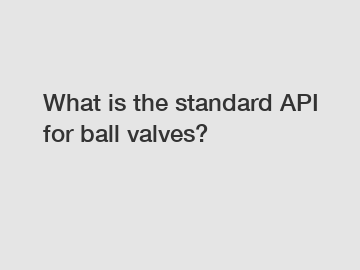Jan. 26, 2024
Hardware
What is the standard API for ball valves?
Ball valves play a crucial role in controlling the flow of various fluids and gases in industries and homes. To ensure interoperability, consistency, and safety, standardized specifications are essential. When it comes to ball valves, the American Petroleum Institute (API) has established the industry standard, API 6D, which provides a comprehensive framework for the design, manufacturing, testing, and performance of ball valves. Let's explore this standard in more detail.
1. API 6D: The Defining Standard.

API 6D outlines the requirements for pipeline ball valves used in various industries, including oil and gas, petrochemical, and water treatment. It covers both trunnion-mounted and floating ball valves, ensuring their compliance with rigorous quality and safety standards. By adhering to API 6D guidelines, manufacturers and users can have confidence in the reliability and performance of these valves.
2. Design and Manufacturing Requirements.
API 6D specifies the design criteria, materials, and construction details necessary for ball valves. It addresses factors such as pressure ratings, materials compatibility, and valve dimensions. The standard also mandates certain features, such as anti-static devices, blowout prevention stems, and fire-safe designs. These requirements ensure that ball valves can withstand demanding operational conditions and mitigate potential hazards.
3. Testing and Inspection Procedures.
To guarantee quality and performance, API 6D defines stringent testing and inspection procedures for ball valves. This includes pressure and leakage testing, durability testing, and material verification. By subjecting valves to these tests, manufacturers can verify their compliance with the standard's performance criteria. Additionally, API 6D requires proper documentation and traceability for material certificates and manufacturing processes.
4. Advantages of API 6D Compliance.
Opting for ball valves that conform to API 6D offers numerous benefits. Firstly, it assures the user that the valve has been independently tested and validated, reducing the risk of malfunction or failure. Secondly, the uniformity in design and specifications allows for interchangeability within systems, simplifying maintenance and replacement processes. Lastly, API 6D compliance promotes safer operations by ensuring valves can handle extreme conditions and are resistant to potential hazards.
5. Global Acceptance and Recognition.
While API 6D is an American standard, it has gained wide acceptance globally. Many countries and industries incorporate or reference API 6D in their own standards and regulations for ball valves. Manufacturers worldwide often seek API certification to enhance the marketability of their products, as it signifies adherence to recognized industry benchmarks. This global recognition promotes uniformity and facilitates the use of ball valves across international projects.
In conclusion, the standard API for ball valves is API 6D, established by the American Petroleum Institute. This comprehensive standard outlines the crucial design, manufacturing, testing, and performance requirements for ball valves, ensuring their reliability and safety. By adhering to API 6D guidelines, manufacturers and users can confidently select and operate ball valves with the knowledge that they meet rigorous industry standards. Whether in the oil and gas, petrochemical, or water treatment sectors, API 6D-compliant ball valves offer a robust solution for fluid and gas control.
The company is the world’s best buy surface safety valve, peek valve seats, surface safety valve supplier. We are your one-stop shop for all needs. Our staff are highly-specialized and will help you find the product you need.
If you are interested in sending in a Guest Blogger Submission,welcome to write for us!
All Comments ( 0 )